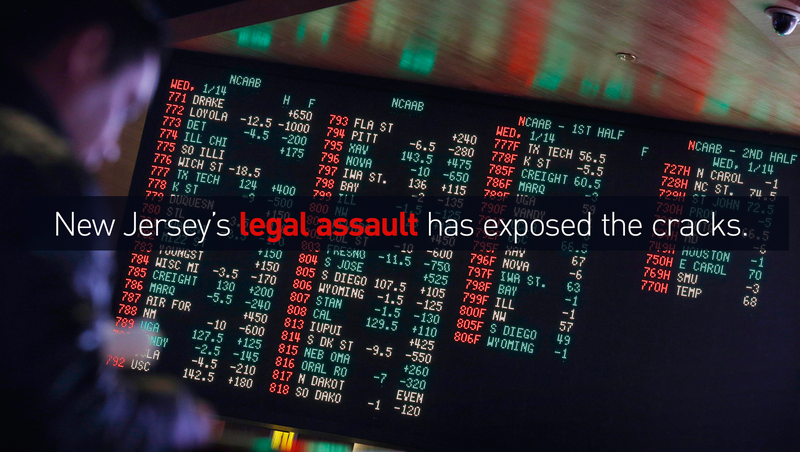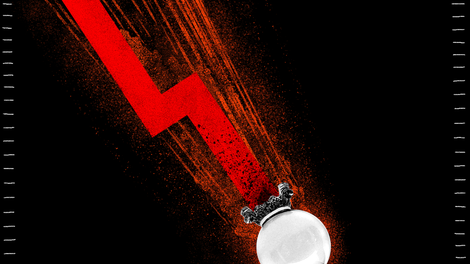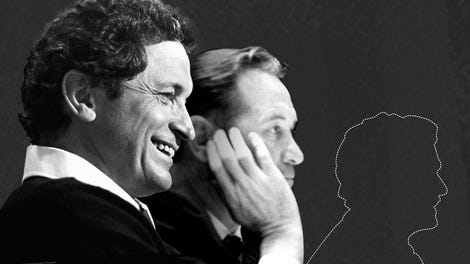
Millions of Americans are gearing up for their fantasy football drafts. And thanks to the scores of lobbyists and lawyers employed by the daily fantasy sports industry, DraftKings and FanDuel are back in business in New York and many other states, just in time for the start of the NFL season. For the price of an “entry fee,” you can win a valuable “prize,” not to mention “bragging rights” among your friends, family and co-workers. Just don’t call it “gambling” though.
While one form of sports gambling is being codified into law in various states, another continues to run into roadblocks. Traditional single-game sports betting, legal only in Nevada, remains stuck in a time-warp, thanks to a 1992 federal law known as the Professional and Amateur Sports Protection Act (“PASPA”), which prohibits state governments from authorizing or licensing sports betting, except in those states where it was already legal before PASPA went into effect.
But one state—New Jersey—has been pushing back against the federal ban, engaging in a nearly five-year battle to legalize sports wagering. New Jersey has challenged the federal law in court, arguing it’s unconstitutional because it interferes with state autonomy and allows certain states (like Nevada) to offer sports betting, while prohibiting other states from doing so.
New Jersey may have reached the end of the line, however, when a federal appeals court recently shut down the state’s latest attempt to legalize sports betting: a “partial repeal” that would have decriminalized sports betting at the state’s casinos and racetracks. After the four major professional sports leagues, the NCAA, and the U.S. Department of Justice cried foul—asserting that this partial decriminalization amounted to a de facto “authorization” and “licensing” of sports betting in violation of PASPA—a Trenton federal district court judge entered an injunction preventing New Jersey from implementing its new law. Last month, a Philadelphia-based federal appeals court upheld the lower court’s injunction by a 9-3 vote, ruling that New Jersey’s plan violated PASPA and rejecting New Jersey’s argument that PASPA was unconstitutional.
Shortening The Timeline Through Continued Court Challenges
In the wake of New Jersey’s latest federal court setback, several commentators have urged a different approach to legalizing sports betting: lobbying Congress to repeal or alter PASPA. While lobbying efforts (such as those undertaken by the American Gaming Association) should continue to be deployed and can be effective, I believe the strategy that will best accelerate the path to expanded legal sports relies on continued litigation.
This is all about pressure and leverage. If a state succeeds in overturning PASPA—and it only takes one—it will open the floodgates to expanded legal sports betting nationwide. The first state to win in court will derive an instant benefit: legal sports betting within its borders right away, and with a head start measured in years.
This will have an immediate channeling effect that will benefit all states. The professional sports leagues would likely respond to one state’s courtroom success by lobbying Congress to enact a uniform federal framework, which would allow all states to legalize sports betting, so as to avoid the inevitable confusing patchwork of state laws that would emerge. All it will take is just one successful court challenge to create this domino effect. But it requires continued persistence by the true stakeholders in this constitutional battle: not the sports leagues or the casinos, but the states themselves.
In the absence of a successful court challenge, we are likely on a much slower train to expanded legal sports betting. Most seasoned observers believe that a Congressional repeal of or amendment to PASPA to allow state-sponsored sports betting is at least three to five years away. Some are even more pessimistic, and believe the timeline is considerably longer. This timeline could be shortened considerably through additional litigation pressure—either through one state succeeding in court or by a group of states mounting legal challenges. The pendency of multiple cases could be enough to achieve the desired effect, e.g., the sports leagues urging Congress to act. It’s one thing for the leagues to litigate against a single state (as they successfully did with New Jersey), but it’s an entirely different animal to have to confront multiple legal challenges by pockets of insurgent states.
While the professional sports leagues have slowly begun to embrace the prospect of expanded legal sports betting, they are in no rush to do the states’ bidding. At this year’s South by Southwest, NBA Commissioner Adam Silver pointedly stated during his keynote address that the league would not be lobbying Congress to repeal PASPA. He clarified his earlier published remarks calling for the legalization of sports betting by explaining that he was just trying to “get people talking about it” without necessarily committing to a specific “timeline” on a broader legalization.
Without continued court challenges by states, sports leagues would have no sense of urgency to expedite the timeline for expanded legal sports betting. Actions speak louder than words, and so does inaction. It has been over 600 days since Silver sounded the clarion call on sports betting in a New York Times op-ed, and to date there has been no movement in Congress or action by the leagues in furtherance of this objective, other than their continued investment in daily fantasy sports. Additional court challenges plus continued lobbying by the American Gaming Association are the obvious antidotes for this institutional inaction.
The Importance Of The New Jersey Case
This is where New Jersey comes in. The Garden State’s relentless efforts to legalize sports betting provide the obvious template for other states to follow. New Jersey’s losing effort managed to expose, through several dissenting court opinions—and even in the majority rulings—significant cracks in PASPA’s armor that may have left PASPA susceptible to a knockout blow by another state, or even by Indian tribes, which are likewise constrained by PASPA and therefore also have standing to challenge the federal law.
In the first 20 years following PASPA’s enactment, no state governmental body had challenged the constitutionality of the federal statute. That all changed in 2012, when New Jersey passed a sports wagering law that would have permitted state authorities to license sports wagering in the state’s casinos and racetracks, teeing up the first court battle over the constitutionality of PASPA. New Jersey lost that one in the U.S. Court of Appeals for the Third Circuit by a 2-1 vote. Then, in 2014, New Jersey believed that it had another winning argument (based on language in the prior Third Circuit opinion) that a “partial repeal” of state laws prohibiting sports betting would not violate PASPA.
We all know how that ended. But the final result, with only a slim possibility of the Supreme Court hearing the case remaining, should not obscure the fact that New Jersey played a critical role in both framing and advancing the current debate on expanded legal sports betting. Without New Jersey, there likely is no Adam Silver op-ed, or any other acknowledgement by the NBA and other sports leagues that expanded legal sports betting is “inevitable.” The pressure and vulnerability created by the New Jersey case—which spawned five court decisions, several stinging dissenting opinions, and the rarely invoked en banc rehearing process—made the sports leagues nervous and forced them to confront the possibility, and future, of expanded legal sports betting much earlier than they otherwise would have.
Silver’s op-ed was published shortly before a federal judge was scheduled to rule on the leagues’ latest effort to block New Jersey from legalizing sports betting. That was no coincidence. The leagues, and the NBA in particular, wanted to reinforce the notion that unregulated legal sports betting would be anathema to the integrity of their games. But in doing so, Silver also finally put his cards on the table: he called for the legalization and regulation of sports betting though a uniform federal framework.
The Third Circuit’s recent decision in NCAA v. Christie (usually called the “Christie II” case) did not sound the death knell for future court challenges by other states. A single decision from one federal appellate circuit—there are 11 federal appellate circuits, plus the D.C. Circuit and the Federal Circuit—cannot and should not be the final word on the constitutionality of PASPA, particularly when that circuit issued not one, not two, but three divided court opinions, and, even in a defeat for New Jersey, opened up a variety of pathways for states to legalize sports betting through the courts and otherwise.
Other States Can Follow The New Jersey Roadmap
As a result of the Third Circuit’s latest split decision, we now know that a state can legalize sports betting through a partial repeal of state laws, though perhaps one not nearly as targeted or selective as New Jersey’s unsuccessful attempt. While the court’s opinion didn’t provide specific examples of a partial repeal law that would not violate PASPA, Judge Marjorie Rendell, writing for a majority of the Court, nonetheless acknowledged that the ruling against New Jersey “does not preclude the possibility that other options may pass muster.” Additional court challenges by New Jersey or other states could potentially provide that clarity and open more avenues for states.
More importantly, the New Jersey case has provided other states with a ready-made template to follow in challenging PASPA on constitutional grounds. New Jersey’s constitutional arguments were grounded in basic “federalism” principles, namely, that the states should be able to operate with limited interference from the federal government, and that any federal regulations must treat the states equally. Along those lines, New Jersey argued that PASPA violates: (1) the Tenth Amendment’s “anti-commandeering” doctrine, which forbids Congress from commanding or dictating how a state regulates or governs its own citizens; and (2) the principle of “equal sovereignty,” which requires the federal government to respect the equal dignity of the states by regulating them on equal terms.
The anti-commandeering argument, in particular, found traction with three of the 12 judges on the Third Circuit’s en banc panel, with Judge Thomas Vanaskie concluding in his dissent that PASPA violates principles of federalism by “effectively command[ing] the States to maintain and enforce existing gambling prohibitions” and “dictating the manner in which States must enforce a federal law.” While this argument failed to persuade a majority of the Third Circuit judges, it could find greater success in a different federal judicial circuit, particularly in a more conservative court that would likely be more receptive to the type of federalism arguments that New Jersey advanced.
But it is the “equal sovereignty” argument, addressed in the first lawsuit between New Jersey and the professional sports leagues (the so-called “Christie I” case), which may ultimately prove to be the winning one. That argument is grounded in the notion that PASPA does not treat all states equally; instead, it affords uniquely favorable treatment to Nevada and three other states (Delaware, Montana, and Oregon) by allowing those four “grandfathered” states to offer sports betting to varying degrees, while banning the other 46 states (including New Jersey) from offering any form of sports gambling.
In Christie I, the Third Circuit held that the principle of equal sovereignty does not apply to legislation (such as PASPA) enacted pursuant to the Commerce Clause of the U.S. Constitution. The Third Circuit distinguished it from Shelby County v. Holder, 133 U.S. 2612 (2013)—a voting rights act case that was decided on the basis of equal sovereignty—on the ground that PASPA involves the regulation of commerce, not elections. But nothing in Shelby County or any prior Supreme Court decisions appears to suggest that the principle of equal sovereignty is limited to voting rights cases. In her dissenting opinion in Shelby County, Justice Ruth Bader Ginsburg specifically referred to PASPA as an example of a federal statute that treats states differently, observing that such statutes are “hardly novelties,” but pointedly asking whether such statutes “remain safe given the Court’s expansion of equal sovereignty’s sway.”
While the Supreme Court declined to review Christie I despite the apparent inconsistency with Shelby County, a court in a different federal judicial circuit could part ways with the Third Circuit and conclude that the equal sovereignty principle applies to Commerce Clause legislation. If that were to occur, PASPA might not survive scrutiny under the Shelby County test, which looks to whether the statute’s disparate geographic coverage is “sufficiently related to the problem that it targets.” This is where PASPA is especially vulnerable, as the reason for the disparate treatment of Nevada, Oregon, Montana, and Delaware was to protect the economic interests of those states that had already legalized sports gaming prior to the enactment of PASPA. But such carve-outs do not appear to be “sufficiently related” to the targeted goals of PASPA, which are to stop the spread of legal sports betting and to protect the integrity of professional and amateur sports.
Thus, even in losing two battles, New Jersey might have shown how to ultimately win the war. Given the cracks in PASPA that New Jersey exposed, another state could be the beneficiary. New Jersey was ably represented by a cadre of preeminent lawyers, including renowned appellate attorney Ted Olson, a former United States Solicitor General, who crafted the intricate and complex constitutional arguments over a four-year period spanning two district court cases and three appellate oral arguments. These nuanced arguments have thus been “road-tested” and developed at the highest levels of sophistication, and can be easily retrofitted by other states at a fraction of the reportedly more than $3 million in legal fees spent by New Jersey in litigating the two sports betting cases.
The Cost is Worth It
A state that takes the baton from New Jersey would likely bear a much lower cost, since so much of the heavy lifting has already been done. While some argue that it would be a waste of taxpayer money to fund further legal challenges to PASPA, and that the focus going forward should be on lobbying Congress, that mindset presupposes that the lobbying and litigation paths are mutually exclusive. They are not. Both can and should be pursued. Moreover, it requires a tremendous leap of faith to assume that a Congressional repeal or alteration of PASPA will happen organically without countervailing pressure, especially with such a gridlocked Congress. Legalizing sports betting is just not high enough on the current list of priorities for Congress to expect action anytime soon, particularly when the sports leagues—the true gatekeepers of PASPA—are content to maintain the status quo while they reap substantial economic benefits from their alliance with daily fantasy sports, the closest thing to legalized nationwide sports gambling.
Could litigation get expensive? No doubt. But sports betting would benefit states in myriad ways: the creation of new jobs, increased tourism, additional tax revenues, and a boost to the state’s gaming and racing industries, while also putting a sizable dent in the black market for sports betting and dramatically lowering a state’s law enforcement costs in cracking down on illegal gambling. Should a state gamble a low-seven figure amount to reap a potential multi-billion dollar return on investment? To ask that question is to answer it.
The Potential Challengers To PASPA
So which states are likely to challenge PASPA? At least 40 states have commercial casinos, so the pool of potential challengers runs deep. Certainly, those states in more conservative-leaning federal judicial circuits, such as the Fifth Circuit (covering Texas, Louisiana, and Mississippi) and the Eighth Circuit (covering North Dakota, South Dakota, Minnesota, Iowa, Nebraska, Missouri, and Arkansas), would be well positioned to challenge PASPA on constitutional grounds, based on the likely appeal of a federalism-based argument in those courts. Two states jump out to me: Mississippi and Minnesota. Both have previously expressed interest in legalizing sports betting, and, in recent years, introduced legislation (see here and here) aimed at accomplishing that objective.
Mississippi, in particular, is worth watching. With 28 commercial casinos, but declining gaming revenues, the Magnolia State may represent the perfect storm for a successful PASPA challenge. Recently, the American Gaming Association held a “Get to Know Gaming Event” in Biloxi, Mississippi, to argue for the positive economic and community impact that gaming has in Mississippi and the Gulf Coast, especially in the wake of recent major natural and man-made disasters that have affected the state.
The subject of sports betting was front and center at the Mississippi event, with AGA President Geoff Freeman declaring that “sports betting offers a tremendous opportunity to give Southern Mississippi sports fans what they want and ensures gaming continues to benefit Mississippi for years to come.” Echoing that same point, Larry Gregory, executive director of the Mississippi Gaming and Hospitality Association, told the audience that “sports betting may be the next step in the journey that gaming has made in Mississippi. It could add another level to this platform of revenue and bring even more income to the state and its economy.” Clearly, there is strong interest in bringing legal sports betting to Mississippi.
Other potential PASPA challengers would be states that have already enacted legislation to legalize daily fantasy sports. These states include New York, Mississippi, Indiana, Virginia, Colorado, Missouri, Massachusetts, and Tennessee. (One influential New York lawmaker, J. Gary Pretlow, recently told a gaming industry publication that New York will be “looking at challenging the feds” on PASPA and said not to be surprised “if you see a state like New York putting through legislation on this very shortly.”)
Recent state measures to legalize daily fantasy sports may prove to be the catalyst for legalizing sports betting. One unintended consequence of the new DFS laws is that they may have provided states that have enacted such laws with a “winning argument” in future PASPA cases.
Since PASPA, in my view (see here and here), also encompasses state-authorized wagering schemes on “athlete performance,” not just game-level outcomes, the recent state laws authorizing daily fantasy sports create a quandary for the professional sports leagues and the U.S. Department of Justice, the likely plaintiffs in any lawsuit to prohibit a state from legalizing sports betting.
A plausible argument can be made that the leagues and the DOJ are “selectively enforcing” PASPA by opposing state efforts to legalize traditional sports betting, as in the case of New Jersey, but “looking the other way” on state DFS laws (which presumably also violate PASPA). In the leagues’ case, this could be seen as entirely self-serving given their financial partnerships with FanDuel and DraftKings. I don’t believe they can have it both ways. Either PASPA applies to both DFS and more traditional sports gambling, or to neither.
At a minimum, this could serve to undermine the leagues’ argument in future cases that they would be “irreparably harmed” by expanded legal sports betting, when they have neither suffered nor asserted any such harm from other supposed violations of PASPA in the DFS context. The “DFS States” are thus perfectly situated to advance a selective enforcement, waiver, or other equitable defense against the sports leagues. These additional equitable arguments, if successfully advanced, could prevent the leagues from securing an injunction against states in future cases, thus serving as a possible tipping point for expanded legal sports betting. While such an argument is not guaranteed to succeed, it provides another possible arrow in the legal quiver to topple PASPA.
Lastly, one intriguing category of potential PASPA challengers would be Indian Tribes, which, through their tribal-state gaming compacts, might be allowed to offer sports betting if it were permitted under federal law. A tribe with the authority to offer sports betting under a tribal-state compact but subject to the constraints of PASPA (such as in the case of the Sisseton-Wahpeton Sioux Tribe of South Dakota, to cite just one example) would likely have standing to challenge PASPA just as any state would. The advantages of a tribal challenge are two-fold: (1) the process of enacting a tribal ordinance would likely be more expeditious than enacting state legislation, which could take months or years; and (2) the lobbying efforts of the professional sports leagues would likely hold less sway with tribes than with elected state legislators. This possibility is not so far-fetched given the growing number of tribes that have expressed an interest in offering sports betting on their tribal lands, but are constrained by PASPA from doing so.
The Time Is Now
The end of the New Jersey case is a critical pivot point in the debate surrounding the legalization of sports betting. While New Jersey still has several long-shot legal options remaining—a Supreme Court review, another “partial repeal” law, a complete decriminalization of sports betting (the so-called “nuclear option,” which would be a difficult sell logistically and politically)—there is no reason for other states to continue remaining on the sidelines. It never made any sense during the pendency of the New Jersey litigation, and makes even less sense now.
PASPA is a failed law. Despite PASPA’s aim of limiting the spread of sports gambling in the United States, illegal sports betting has sharply risen since PASPA was enacted. Estimates of the scope of illegal sports betting in the United States range anywhere from $80 billion to $400 billion annually. As a result, a thriving black market operates outside the reach of law enforcement and of the IRS. Moreover, attitudes about sports betting (and gambling in general) have changed dramatically since PASPA was enacted. New research released by the American Gaming Association in February found that 80 percent of those planning to watch this year’s Super Bowl want to see the country’s current sports betting laws changed. Some 66 percent of those questioned believe individual states should have the ability to legalize sports betting.
But the “inevitability” of legal sports betting is not etched in stone. Since Adam Silver correctly observed that “times have changed” and that “sports betting should be brought out of the underground and into the sunlight where it can be appropriately monitored and regulated,” there has been zero movement on that front. During this time, the four major professional sports leagues have deepened their ties to the daily fantasy sports industry, and the NHL has placed a team in Las Vegas. Eight states have explicitly legalized fantasy sports despite potential legal impediments posed by PASPA and by various state constitutions. Yet, despite these seemingly positive developments, traditional sports betting remains the third rail of the professional sports industry, to be approached about but never touched.
If the leagues are unwilling to advance the discussion in a proactive way, the states can take it upon themselves to shorten the timeline. This can be accomplished through continued lobbying and educational efforts, and by further court challenges. One does not preclude the other. To the contrary, they would be synergistic, with the legal challenges placing pressure on the leagues and Congress to act sooner. The winning formula for expanded legal sports betting in the United States can thus be reduced to a simple equation: litigation + lobbying = accelerated timeline.
As the New Jersey case has shown, PASPA is hanging by a thread. All that’s needed now is one final snip.
Daniel Wallach is a lawyer and shareholder at Becker & Poliakoff. He is an expert on gaming law and sports law, and has counseled professional sports teams, fantasy sports operators, casinos, racetracks, sports betting companies, and other gaming industry participants on a wide spectrum of gaming-related matters. Go vote for his panel on sports betting to appear at South By Southwest.






